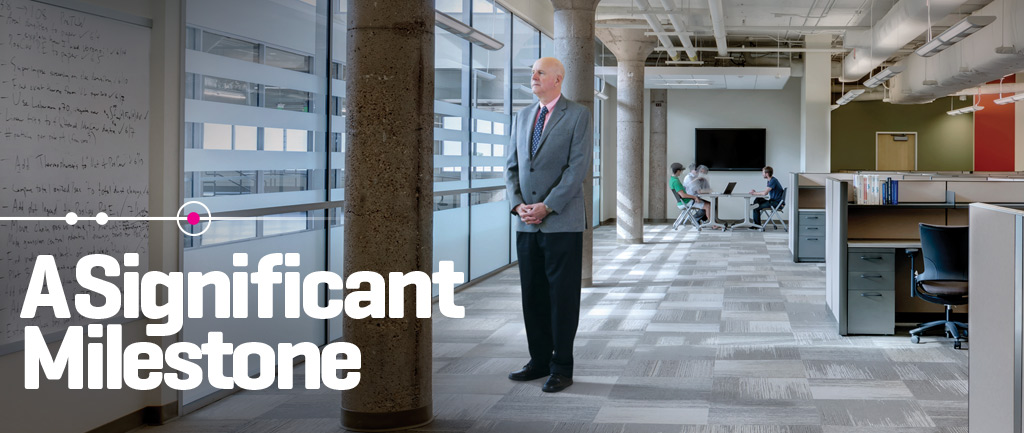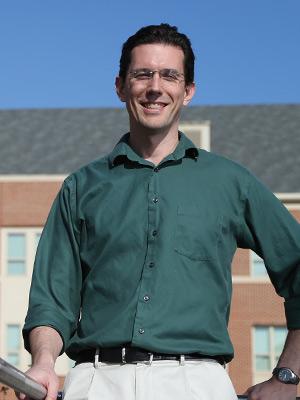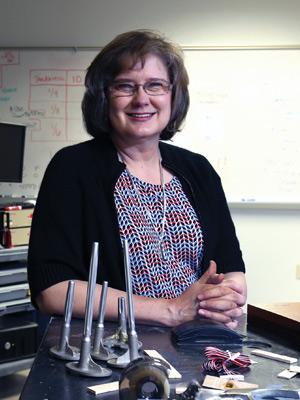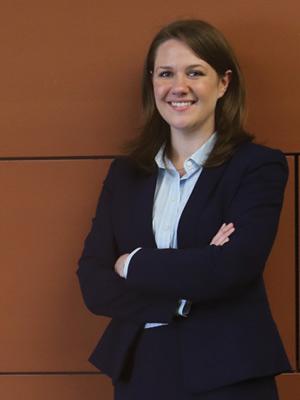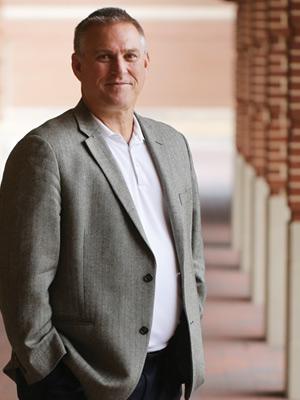A Significant Milestone
As Baylor’s School of Engineering and Computer Science (ECS) turns 20, it enters an exciting era of growth and innovation that promises unprecedented opportunities for scholarship, research and Christian stewardship.
When Baylor’s School of Engineering and Computer Science (ECS) launched in 1995, its success was initiated by a small incoming class of undergraduate students in pursuit of a Bachelor of Science degree in two general tracks through the Department of Computer Science or the Department of Engineering. Five years later, the Department of Engineering would receive ABET accreditation for three baccalaureate majors: electrical and computer engineering, mechanical engineering and general engineering. Then in 2006, the establishment of the Department of Electrical and Computer Engineering and the Department of Mechanical Engineering would open up even more opportunities for students and faculty alike.
From the seeds of those nascent beginnings, it would take less than two decades for ECS to experience the kind of unprecedented growth and innovative change that would propel it to earn a coveted place among nationally ranked engineering and computer science schools at esteemed universities. In fact, among schools whose highest engineering degree is a bachelor’s or master’s, Baylor’s engineering program is now ranked among the top 20 “Best Undergraduate Engineering Programs” by U.S.News & World Report, and ECS has the highest student qualifications outside of the Honors College.
Today, as we celebrate its 20th anniversary, ECS is not only increasing the breadth and depth of its academic offerings as well as expanding and upgrading its laboratory and classroom facilities, but it’s also attracting world-class faculty and high-achieving students who continue to build on the school’s past successes and forge an even brighter future with the promise of exciting opportunities, pioneering breakthroughs and, yes, new challenges.
Discipline Diversity
“When the School of Engineering and Computer Science started, we were a general [undergraduate] program. But with the creation of individual tracks, including the creation of distinct electrical and computer and mechanical engineering departments, our growth has been phenomenal,” says Dean Dennis O’Neal, who joined Baylor in 2012 after a decade in leadership at Texas A&M. “We’ve also created a bioinformatics program and specialized tracks such as the gaming track in computer science that have been successful. Employers look for specific disciplines, and they come here [to Baylor] to recruit.”
Associate Professor of Electrical and Computer Engineering and Faculty Master for the Teal Residential College
Those competitive advantages continue to attract record numbers of highly qualified students to ECS every year. Today, ECS’s more than 1,100 students can engage in exciting, rigorous academic studies that include not only highly dynamic programs with specialized concentrations in engineering and computer science, but also degree-conferring programs in, computer science, bioinformatics, mechanical engineering, and electrical and computer engineering. Students pursuing a general engineering degree have the option of delving into a concentration in biomedical, environmental, geo/petro or humanitarian engineering.
Students also have the opportunity to pursue graduate studies in any of five master’s programs and two doctoral programs — one in mechanical engineering; the other in electrical and computer engineering — in addition to a joint MBA–ME program option and a dual-degree track in which semester hours can be applied toward both bachelor’s and master’s degree requirements. Also in the works is a third doctoral program — this one in computer science — which aims to elevate the school to Tier One status and increase the competitive advantage against peer universities like Texas A&M, Duke and the University of Texas.
Dr. Ian Gravagne, associate professor of electrical and computer engineering and faculty master for the Teal Residential College, arrived at Baylor in 2002 as the program was on the cusp of significant growth in ECS programs and the scholarship of the faculty.
Associate professor and Graduate Program Director of Mechanical Engineering
“From then to now, we’ve experienced a doubling in size,” says Dr. Gravagne, pointing to the success of both the undergraduate and graduate programs. “This is a remarkable set of advances in a relatively short period of time.”
Last fall’s incoming graduate class, in fact, marked the largest in ECS’s history with some 36 graduate-level students. “Our program is a small, selective program, so students feel they can come here for a graduate education and not be just a number,” says Dr. Carolyn Skurla, associate professor and graduate program director of mechanical engineering. “Our hands-on program is characterized by research-active faculty who mentor students in and out of the classroom.”
Even at the undergraduate level, despite the fast-growing student body, ECS offers students a personal experience, she adds. “Faculty still have open-door policies, know students by name and get to know them. Baylor is a Christian university with a caring environment, and faculty still have that heart. This gives students a competitive edge in the job market.”
Student in the PhD Program in Mechanical Engineering
Among those students is Baylor alumna Sarah Stair, the first doctoral candidate in ECS’s new PhD program in mechanical engineering. “As an undergraduate student at Baylor, I really enjoyed the interaction between the students and professors and the professors’ open-door policies. The Christian influence was also very important to me,” says Stair, who credits a research internship that she completed with Baylor engineering professor Dr. Walter Bradley for igniting her love of laboratory research. Nowadays, she is conducting research involving nondestructive testing techniques–namely, ultrasound of carbon-fiber composite materials related to the aerospace and automotive industries alongside Baylor mechanical engineering assistant professor Dr. David Jack.
Raising the Bar
Much of Stair’s work is being performed just a mile off campus at the Baylor Research and Innovation Collaborative (BRIC), the cornerstone of a new 21-acre discovery park that provides researchers, organizations and private companies with not only 300,000 square feet of space for research centers, workforce training and academic meetings, but an environment that serves as a nexus for faculty and students in the science, technology, engineering and mathematics (STEM) disciplines.
While ECS’s Rogers Engineering and Computer Science Building provides approximately 40,000 square feet of modern classrooms, offices and laboratories, it was designed for a program that was less than half the size of the school’s current program, notes Dr. O’Neal. “About four years ago, there were approximately 400 students [enrolled in the school]; now, it is about the size of the freshman class alone,” he says. “The BRIC opens up lab space that was sorely needed in our program for faculty and students to conduct research and have the facilities to do it. We are building out labs and putting in state-of-the-art equipment, which is a draw for more research funding. The BRIC also makes it easier to attract top faculty candidates; when you take them through the BRIC during the interview, they see where their lab will be, and the new lab space is very attractive.”
The BRIC is a magnet for attracting outstanding faculty, says Dr. Ben Kelley, professor of mechanical engineering and former dean of ECS. “The BRIC is new, big and impressive. It has lots of space, a [beautiful] design and the ◊ latest equipment. When [prospective] faculty and graduate students see it firsthand, it’s very attractive to them. And the competitive, leading research that’s happening there is ‘big time’; it looks like those universities that have been doing research for years,” he says, adding that the space will become even more inspiring as it’s being built out. “This level of research takes Baylor up several notches. The BRIC gives a boost to Baylor — and Waco.”
As additional faculty advance research activity — and build up research funding — the goal is to take Baylor from the Carnegie Classification of being a university with “high research activity” to one with “very high research activity,” notes Dr. O’Neal. And as ECS’s reputation rises, so do student applications — along with competition — for admission to the school. “Last year, we had more than 5,000 applicants. There is a lot of demand for our program, and as demand has gone up, so has the [academic] quality of applicants. It’s very encouraging,” he adds. In fact, ECS students have the second highest average SAT scores at Baylor — averaging 1294 (just 86 points under the Honors College).
“Baylor’s aspiration of achieving transformational education and compelling scholarship within a committed Christian community is unique among comprehensive research universities,” says Dr. Michael Thompson, associate dean for undergraduate programs. “Within ECS, we are at an exciting point in the growth curve of our programs where research opportunities arising from our graduate programs have strengthened our undergraduate programs by providing exciting opportunities for all ECS students.” And it’s the uniqueness of ECS, coupled with a Division I school rooted in a Christian mission, that’s a lodestone for these high-achieving students, adds Dr. O’Neal. “There aren’t other evangelical schools that have Division I football teams,” he points out. “You can’t discount the impact of sports on academics.”
When you consider the significant role that sports play in Texas, Baylor is exceptional, says Dr. Kelley. “Baylor offers a unique mix of athletics and academics; yes, academically minded Baylor has great success in athletics,” he says. “Still, education is held in the highest regard, as is Baylor’s Christian heritage. No other school has those three factors that are so high on students’ lists.”
Living, Learning and Thriving
Associate Dean for Undergraduate Programs
Another distinctive aspect of ECS that can’t be discounted is the Teal Residential College, which houses some 350 students — most of whom are engineering or computer science majors. This living-learning community nurtures a supportive environment of scholarship and friendship that extends beyond the classroom walls into faculty exchanges, focused study groups, social events and chapel.
Studies have shown that living-learning communities such as Teal translate into increased student retention and success. “There are both short-term and long-term outcomes for students who spend time here,” says Dr. Gravagne. “Students need to be present to support each other and develop relationships to propel them in the program and keep them in the major. They also develop leadership skills that they apply as leaders in their residential community.” Faculty interaction with students has always been a leading benefit of Baylor’s program, and to help cultivate those interpersonal relationships, decreasing the size of student to teacher ratios is an important goal for ECS, notes Dr. Skurla. With ECS’s recent rapid growth, ratios have been increasing, but the aspiration is to have a 15:1 student to faculty ratio. To achieve that, enrollment must be balanced, ultimately making it more challenging to be admitted to ECS, she adds.
While admission will be curtailed, the number and diversity of programs will continue to expand, including the exploration of concentrations in biomedical, environmental, geo/petro, and humanitarian engineering. Since engineering and computer science are disciplines in increasingly high demand in fast-growing and fast-changing industries, ECS often turns to its Board of Advocates, composed of 28 highly respected industry leaders who hold top positions in corporate, industrial, research, government and educational institutions, for oversight, advice and direction to the programs. And while Baylor has no intention of growing in student population or program offerings to match those found at some other peer institutions, notes Dr. O’Neal, its aspirational peers do include such institutions as Vanderbilt, Duke, Notre Dame and Rice universities. Baylor will always have something special that sets it apart from its peers.
“A student can come [to Baylor] and study under faculty who are serious about scholarship and research and also [serious about] integrating their faith with their discipline,” says Dr. O’Neal. “We get students who want to serve people and God with what they do.”
Examples of that Christian commitment within ECS are the Engineers with a Mission and Computing for Compassion student organizations. Through service projects in developing countries —and locally in Waco — students use their technical talents to promote the use of technology and spread the message of the Gospel. Past mission trips have included those to Haiti, Rwanda and Honduras.
“ECS faculty and students have a steadfast commitment to explore and discuss what it is we mean by Christian higher education in the context of an engineering [or computer science] major,” says Dr. Gravagne. “There’s nothing different [at comparable schools] about learning how a circuit works, but there’s a difference about the development of students’ character and how they think about using their skills.”
That “difference” is what many employers look for and why, every year, such companies as Chevron Phillips, Bell Helicopter, Boeing, Halliburton, Lockheed Martin, Samsung, Phillips 66, IBM and Exxon Mobil come to campus to recruit. Baylor also has a strong ROTC program, with a long history of graduates serving our country in the military, notes Dr. Skurla.
“I find it gratifying to feel like we share in the success of our graduates as they have achieved their own personal and professional milestones over the past 20 years,” adds Dr. Thompson. “I hope our graduates will take the occasion of the 20th anniversary as an opportunity to tell us about their accomplishments.” For the next generation of graduates, the goals for both undergraduate and graduate programs are ambitious, he adds. “On the undergraduate side, simply stated, we want to stand alongside the very best in the country. We face challenges in managing prospective student and employer demand for ECS programs, which, admittedly, is a nice problem to have.”
Wherever the path from ECS leads Baylor graduates, one thing is certain: they will arrive prepared. And if the last 20 years is any indication of where students, faculty and staff are headed, the future of ECS shines bright, indeed.
